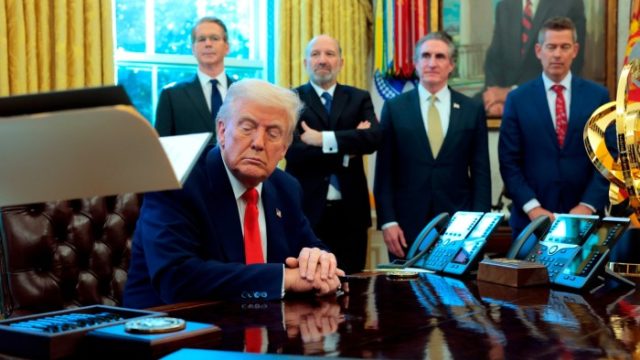Unlock the Editor’s Digest for free
Roula Khalaf, Editor of the FT, selects her favourite stories in this weekly newsletter.
The US has told the EU that some American trade tariffs would remain in place even after negotiations between the two sides, and has given little indication about how Brussels can reduce them, according to European officials.
Two EU diplomats briefed on a meeting on Monday between EU trade commissioner Maroš Šefčovič, US commerce secretary Howard Lutnick and US trade representative Jamieson Greer said the American side made clear Washington would retain some level of tariffs.
They discussed US President Donald Trump’s so-called reciprocal tariffs on the EU, set at 20 per cent, along with his 25 per cent levies on US imports of steel, aluminium and cars.
The ‘reciprocal’ tariff covering most US imports from the EU has been cut to 10 per cent for 90 days to allow for talks between the two sides.
The EU diplomats said US negotiators stressed their desire to repatriate industry from overseas, which required tariffs to stay in place at some level.
“The US is not ready to reduce tariffs on cars or steel but maybe had flexibility on the reciprocal tariffs but their baseline would be 10 per cent. So what is there to be flexible on?” said one of the diplomats.
The second diplomat said chaos in the Trump administration made it hard to know what was genuine policy and what was a negotiating tactic.
“They change quite often,” they added. “It’s also difficult to distinguish who has the power to say something and who says something with no power or influence at all.
“Keeping the tension, making everything ‘temporary’ has become pretty much a pattern.”
The European Commission declined to comment on tariff levels, but it called on the US to outline its demands.
“We need to hear more from the Americans. We need to have a clearer idea of what their preferred outcomes are in these negotiations,” EU trade spokesman Olof Gill said on Tuesday.
Gill added Šefčovič had repeated an offer to mutually drop all industrial goods tariffs.
“The EU is doing its part. Now, it is necessary for the US to define its position. As with every negotiation, this must be a two-way street . . . with both sides bringing something,” he said.
The commerce department and office of the US trade representative did not immediately respond to requests for comment about the American stance in Monday’s meeting.
The US listed a long set of grievances this month when it imposed, and then paused, reciprocal tariffs on many trading partners.
Calculations of tariffs by the Trump administration were based on the trade surplus in goods between these countries and the US. The EU was given 20 per cent, based on the $235bn goods surplus it had in 2024.
Trump has said the EU should buy more liquefied natural gas from the US, to which Brussels has agreed in principle.
He has attacked the bloc for not buying enough cars from America and EU “non-tariff barriers” that exclude US chicken rinsed with chlorine-based chemicals.
Trump instructed officials on Monday to conduct probes that could pave the way for tariffs on imports of semiconductor and pharmaceutical products.
Šefčovič reiterated the importance of resilient transatlantic supply chains in those sectors, Gill said.
He said the meeting was a “focused scoping” session, with the EU’s zero-tariff industrial goods proposal and global overcapacity in the steel and aluminium industries both covered, but he added that the bloc’s food safety standards were “sacrosanct”.
Gill said: “The EU will continue to approach these talks in a constructive manner, with a view to identifying areas of common interest. It is clear that significant joint efforts will be needed to achieve a successful outcome within the 90-day window.”
The EU has paused its retaliatory tariffs, drawn up in response to the US steel and aluminium levies, until July 14.
Gill said the EU was continuing to work on further measures in response to other US tariffs, in case no agreement wa reached.
An official from the office of the US trade representative said: “Numerous countries have been very responsive to the United States’ willingness to negotiate and talks are proceeding quickly. US officials have repeatedly communicated the president’s trade policy agenda to their European Union counterparts regarding the need to lower tariffs and non-tariff barriers.”
Additional reporting by Aime Williams in Washington










